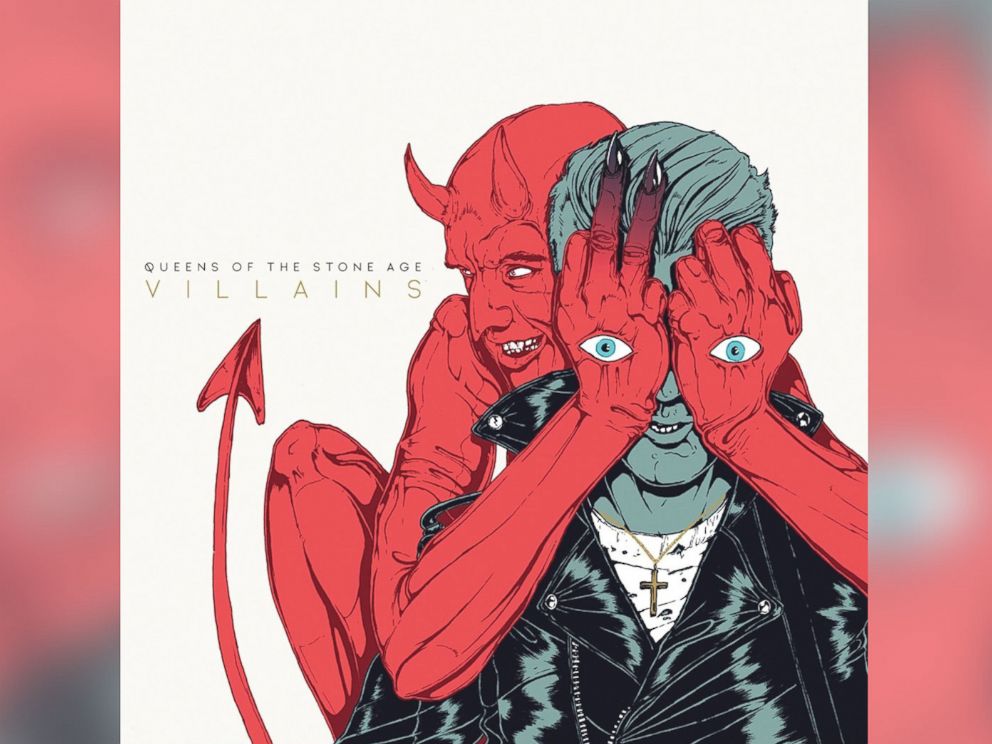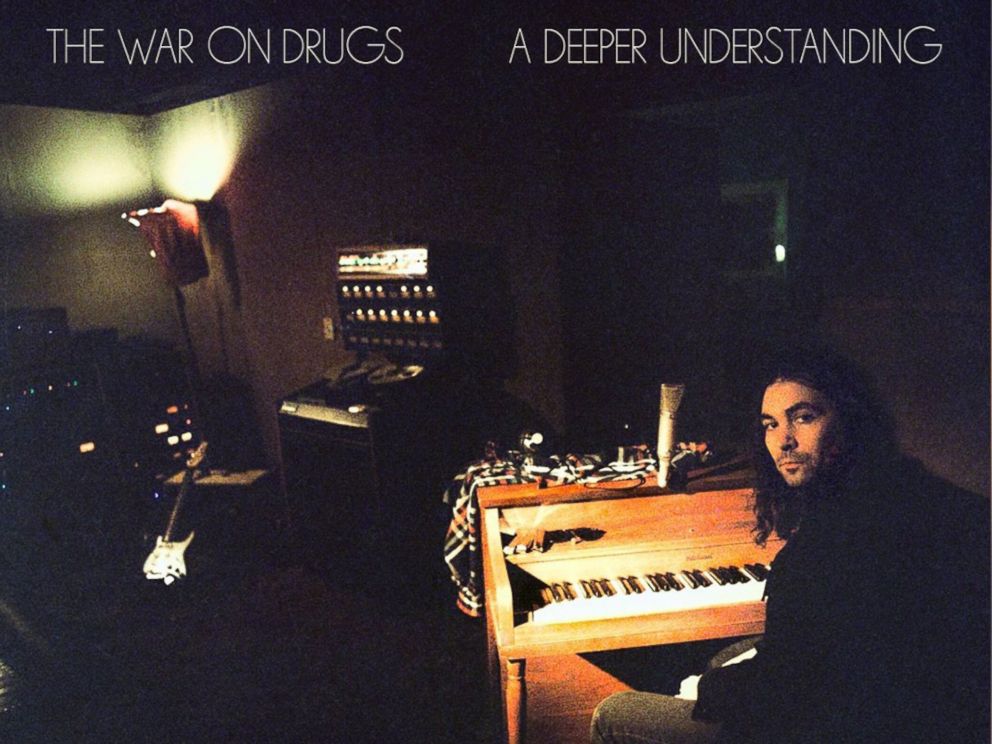Reviews: Fifth Harmony, Queens of the Stone Age, EMA and more
Plus, get reviews of the latest from Queens of the Stone Age, EMA and others.

— -- This week, pop group Fifth Harmony release their first album as a quartet, Queens of the Stone Age drops a new Mark Ronson-produced collection, art-rocker EMA returns with her third album, indie rockers the War on Drugs fuse old and new sounds, indie-folk artist Iron & Wine releases a new LP, and rapper Planet Asia joins forces with DJ Apollo Brown.

Fifth Harmony’s “Fifth Harmony”
**1/2
When your band’s name is Fifth Harmony, making your first album going from a quintet to a quartet your self-titled effort is a gutsy move. This is the group’s third album in three years, and the first since Camila Cabello departed in December.
“Fifth Harmony” as an album is a 34-minute slice of modern pop. The clipped lyrics and the repeated cries of “Eh! Eh! Eh!” throughout don’t allow the newly-minted foursome to set their own paths. There’s some effective energy on “He Like That,” but then there’s the faceless party-anthem “Sauced Up.” “Make You Mad,” sort of works with its electro-Caribbean flow, although the synth-line is the most appealing part of the song.
You get the feeling that although the four members are talented, that this isn’t the best vehicle for them. If you listen to “Deliver,” “Angel” or “Lonely Night,” it’s as if they are mining a now stale formula that Destiny’s Child pretty much perfected right around the time of “Bills, Bills, Bills.” They do better on the pop-ballad “Don’t Say You Love Me,” a song that relies more on emotional heft over stereotypical sass.
On the surface, this is a perfectly satisfying record for passive listeners who aren’t taking it apart and dividing it into its elements. You can imagine “Messy,” for instance, being a decently-sized hit, but there’s something missing.
This record will probably perform decently, but you get the feeling that these singers deserve more memorable, substantive material. Outside of the songwriting credits they receive on several tracks, it speaks volumes that nowhere in the liner-notes does it say who Fifth Harmony is with the members’ last names listed. There is a lot more potential than what is on display.
Focus Tracks:
“Don’t Say You Love Me” Hands down, this is the best song on the record, because this acoustic-guitar-led ballad pairs the tropical rhythms with an emotional and melodic backbone.
“He Like That” Sure, this is straight-up formula, but it also has a dub-fueled pop bounce that somehow lifts it above the rest of the pack.
“Messy” Another ballad, this song (with its 19 writers) sounds like an appealing dose of pop from the post-Bieber, post-“Sorry” era.

Queens of the Stone Age’s “Villains”
***1/2
On their first album in four years, Queens of the Stone Age join unlikely forces with producer Mark Ronson to make “Villains,” a nine-track record with prog-rock keyboard solos and a glam-driven, hard-driving approach. Throughout the record, Joshua Homme’s vocal delivery brings to mind both Marc Bolan and David Bowie, with his earnest sense of drama. This is a bit of a throwback record, as expected. QOTSA are firm mainstays in the hard-rock arena, and this record hints at a specific part of the 70s.
The rigid, angular stomp of “Domesticated Animals” has a threatening energy, while “Fortress” has a dense intensity as it builds.
This album is low on up-tempo rockers, making the frantic “Head Like a Haunted House” stand out all the more. This is more of a mood-driven album on the whole than a hook-driven one. On tracks like “Un-Reborn Again,” Homme and company do find a comfortable sweet spot in a sleaze-drenched corner of ominous-sounding rock. This is a sometimes muscular, often doom-heavy exercise packed with a semi-eerie sense of momentum.
Homme plays the “villain” well. The dark tone of this record, given its title, is no doubt meant to give it a concept and each track seems to have an untold backstory. “The Evil Has Landed,” sounds like a classic rock staple but at the same time, there’s a detached, semi-operatic feeling to the vocal line that makes it sound more threatening.
“Villains” might not really make its greatness known for a couple of spins, but something tells me this is a well-thought-out, well-executed record that is worth the time investment needed for it to blossom.
Focus Tracks:
“Villains of Circumstance” This starts as a slow-building, bass-driven exercise before finding some effective lift from a rising chorus. There’s almost a Broadway/cabaret aspect to this song. While you wish the beat that gives the track a push was more present, the seesawing aspects to the song give it some true contrast. Plus the closing solo is coated in dystopian darkness.
“Head like a Haunted House” Honesty, I wish more of the album had this kind of fast-paced drive. This is like a huge adrenaline shot.
“Fortress” A moody, yet melodic exercise, this might be a hit rock single waiting to happen.

EMA’s “Exile in the Outer Ring”
***
With its electro-edges and its post-industrial bits of noise, Erika Anderson’s third record under her EMA moniker has her still sounding like a theoretical lost, creative love-child of Kurt Cobain and Kim Gordon who grew up listening to Love and Rockets’ records. Something about this record feels sadder and more streamlined when compared to her previous two offerings. Here you get songs like “7 Years” and “Blood and Chalk,” which at their cores are reflective folk songs which are fueled by some sort of religious or existential search. The former even mentions a battle “between God and Satan,” as if she’s contemplating the fate of her soul.
The electoclash, fuzz rock of “Fire Water Air LSD” immediately grabs your attention, as does the trippy and semi-chaotic “33 Nihilistic and Female,” with its soulful punk bounce, but calling a song “Aryan Nation” probably isn’t the wisest move, even if the title is only mentioned once in the song.
Anderson often finds momentum drawing on distasteful topics and putting them on display as if she’s telling tales of a dystopian American underbelly. Part performance art, part punk, this creates a frequently conflicting mixture.
This is perhaps the weakest of Anderson’s three EMA records, but it still has some intriguing edges. The dark, melancholy hum of “Receive Love” showcases Anderson’s art-rock side well. It is almost as if she arrived a decade or two too late to the party. She is in many ways this generation’s answer to PJ Harvey or Cat Power.
“Exile in the Outer Ring” is a playfully bizarre, imaginative, sonically challenging record full of harsh edges alongside lush textures. If you are familiar with Anderson’s last two albums, this record won’t be a surprise. It may lack high-points that reach the same level as previous highlights “Marked” or “So Blonde,” but it is still obviously from the same intriguing source.
Focus Tracks:
“Down and Out” Anderson approaches much of this record at a near whisper and really this is just a hushed bit of arty pop, with an accessible core.
“Blood and Chalk” This is a disheveled, shoegaze-fueled hymn, pairing sometimes gruesome, macabre lyrics with a lullaby-like melody.
“I Wanna Destroy” This is almost a simmering meditation of a song. It builds and nearly explodes. She doesn’t allow it to really hit its apex. You kind of wish she’d really shout the refrain a couple times, but the track still has a palpable sense of chaos at its roots.

The War on Drugs’ “A Deeper Understanding”
****
The War on Drugs’ mastermind Adam Granduciel has made a career of trying to create a modern answer to Dire Straits. On the newest offering, “A Deeper Understanding,” he hits his most successful, creative peak, fueling well-crafted songs with dream-pop undertones. This is an expansive record, which spreads its 10 tracks across more than an hour. This is “dad-rock” with an artier soul. Listeners will find themselves getting lost in the textures of “Pain,” and they'll find themselves dancing to “Holding on.”
“Strangest Thing” is an exceptionally well-produced track that is bathed in both synths and warm-guitar textures, sounding almost like an ethereal power-ballad filtered through a Bob Dylan and Tom Petty lens. In other words, this is a strange fusing between modern indie-rock, 80s pop sounds and classic song-craft.
The enveloping warmth of the thoroughly spread “Thinking of a Place” earns its ballooned length of 11 minutes and 11 seconds, and to some degree Granduciel is mining similar territory to Ryan Adams’ work on both “Prisoner” and his self-titled record, attempting to reclaim the stadium rock sounds of the 80s while giving them a more modern makeover.
“A Deeper Understanding” is surprisingly melodic when compared to the previous albums from the band. Granduciel is really crafting strong songs here, when he used to get by on creating a mood. Yes, the previous records would eventually become accessible with repeated listens, but this album has an immediate punch that is instantly apparent. It’s a welcoming, consuming statement of a record.
Focus Tracks:
“Strangest Thing” You can imagine an alternate universe where this beautiful ballad could become a monster hit.
“Nothing to Find” One of the brighter and more upbeat numbers, this recalls Springsteen’s “Born in the U.S.A.”-era in a more positive and effective way than Springsteen’s influence is usually felt. At the same time, this builds and rocks out quite well.
“Thinking of a Place” If you are going to release a track over 10 minutes in length in the middle of your record, it better be good. This fully delivers. Again, Granduciel’s production gives this the treatment it deserves.

Iron & Wine’s “Beast Epic”
****
“Beast Epic” is singer-songwriter Sam Beam’s seventh album under the Iron & Wine name, following up both his 2015 collaboration with Ben Bridwell from Band of Horses and his last proper album in 2013. If you’ve ever heard an Iron & Wine album and are familiar with Beam’s sound, this is a perfectly fine example of a record, showcasing some of the better singer-songwriting folk music of his career.
This album returns him back to Sub Pop after releases for both Warner Brothers and Nonesuch, and while he still maintains a more produced sound than can be heard on his earlier records, this collection plays very much into what longtime fans might expect, from the warm and sweet “Bitter Truth” to the more sweeping “Song in Stone.”
It’s almost as if Beam doesn’t know if he wants to be James Taylor or Nick Drake, but at the same time, he’s creating his own sound, serving as an American equivalent to the likes of Damien Rice.
This 37-minute set, is almost a bit of a restart for Beam, bringing his back to his essence. The delicacy of “Summer Clouds” comes off as fittingly tender, while “Call it Dreaming” is almost his attempt at Van Morrison “Into the Mystic” territory.
Beam in the past could sometimes be too precious. This is not the case here. “Beast Epic” as an album is one of the most confidently assured offerings in his discography. He’s working with a full band here and at the same time, there is something very intimate about these recordings, giving them the right balance. Even if the sing-song-y bounce of “About a Bruise” sounds somewhat pop-y in Beam’s discography, it still doesn’t step over the edge. The same goes for the delicately orchestrated “Last Night,” which experiments but never sounds out of character.
“Beast Epic” shows Sam Beam working with his gifts and showing them off to the best of his abilities.
Focus Tracks:
“Song in Stone” A folk-waltz of sorts, this plays well to Beam’s most tender side, bringing to mind back-catalogue classics like “Naked as we Came.” This is a sound many of Beam’s fans will easily embrace.
“About a Bruise” This song has some appealing lift. If it is played for the right people, it could widen Beam’s audience. It also has a very strong bass-line courtesy of former Soul Coughing member Sebastian Steinberg.
“Bitter Truth” You get the feeling that Beam was born at the wrong time. He would have fit so well with the singer-songwriters of the 70s, 45 years ago, this song would have probably been an instant classic.

Apollo Brown & Planet Asia’s “Anchovies”
****
In 2016, DJ Apollo Brown joined forces with Brooklyn MC Skyzoo for the amazing album, “The Easy Truth.” Now Brown has collaborated with Fresno underground legend Planet Asia on “Anchovies.” If you listened to “The Easy Truth” and liked the beats, Brown brings the same vintage touch here. While he can be a little rougher around the edges than Skyzoo, Planet Asia seems more than up to the task of collaborating.
There’s an appealing scratchiness to this record. Brown is obviously from the 90s school of hip-hop, pairing Asia’s lyrics with some sparse beats. On “The Aura” and “Diamonds,” he’s barely rapping over a beat. The backdrops here are subtle but at the same time, this approach makes you listen more closely, as lyrics are dropped over bare old-school piano and bass loops. On “Dalai Lama Slang,” Asia works up a tight flow over what is essentially a jazz piano scale. It gets to be like a daring exercise in skill.
You wonder if the clicks and pops on the records are actually from the samples or placed over the record as a purposeful coating. “The Easy Truth” sounded scratchy as well, so it seems from going through his back catalog that this is one of Brown’s subtle signature touches.
One of the reasons why this album works is the juxtaposition between Brown’s often beautifully-constructed jazz and classic-soul-minded beats and Planet Asia’s take-no-prisoners delivery that is tough and not for the easily offended. As he raps over “Avant Guarde” there’s a feeling like these are two performers from different universes coming together. The violence in Planet Asia’s verses on “Nine Steamin’” and “You Love Me” is almost downplayed by Brown’s deceptively gentle accompaniment.
“Deep in the Casket” samples Nina Simone’s “Plain Gold Ring” to great effect. Simone, unsurprisingly remains an evergreen source for hip-hop backdrops.
Throughout this 15 track set, this album nicely pairs Brown’s historically knowledgeable beats with Planet Asia’s street-wise rhymes. “Anchovies” is at times a disarming collection, thick with old-school freshness. This is vintage hip-hop to the bone.
Focus Tracks:
“Pain” This is a moving track where Planet Asia discusses all the friends and relatives he has lost to violence and illness. He says, “Life is short. / But love is forever. /The bond of the family is how you get it together.” True to its title, this is a song about anguish, every day struggles and gut-churning loss.
“Dalai Lama Slang” (Featuring Willie the Kid) Hip-hop taken to its essence, as Asia and Willie the Kid drop verses over a shockingly sparse beat. I would bet most younger cats calling themselves rappers wouldn’t know how to approach this track if it was handed to them.
“Deep in the Casket” That bassline of “Plain Gold Ring” really gives Asia’s street-wise rhymes an extra bit of ominousness.
Coming Up: New albums from LCD Soundsystem and more.
Missed last week's? Get the latest from Grizzly Bear, Shelby Lynne & Allison Moorer, the Accidentals and more.




